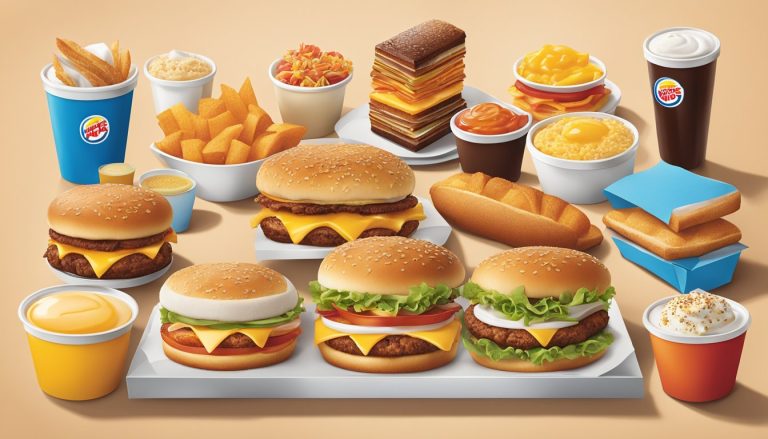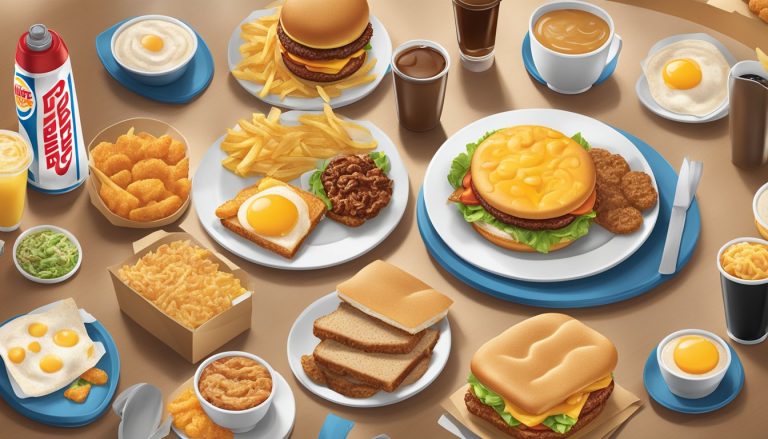Burger King’s breakfast menu offers a variety of options for early morning diners. From hearty platters to handheld sandwiches, the fast food chain caters to different tastes and appetites. A typical BK breakfast platter contains approximately 810 calories, with 480 of those calories coming from fat.
The BK Breakfast Platter serves as a prime example of the chain’s morning offerings. This substantial meal includes classic breakfast staples, providing a significant portion of an adult’s daily caloric intake in one sitting. Burger King’s menu also features lighter options for those seeking a less calorie-dense start to their day.
Nutritional information for Burger King’s breakfast items is readily available, allowing customers to make informed choices. The chain updates its nutrition facts regularly, with the most recent data reflecting values as of late 2024. This transparency enables patrons to align their meal selections with personal dietary goals and requirements.
Overview of Burger King’s Breakfast Offerings

Burger King’s breakfast menu features a variety of items to suit different tastes and appetites. The offerings range from sandwiches to platters, with options for both indulgent and lighter fare.
Differentiating BK Breakfast Items
Burger King’s breakfast lineup includes several signature items. The Croissan’wich, introduced in 1983, combines eggs, cheese, and meat on a croissant. French Toast Sticks, added in 1985, provide a sweet option. The menu also features biscuit sandwiches, pancakes, and hash browns.
Nutritional content varies across items:
- Croissan’wich (with sausage): 500 calories, 33g fat, 980mg sodium
- French Toast Sticks (5 piece): 410 calories, 20g fat, 260mg sodium
- Hash Browns: 250 calories, 15g fat, 580mg sodium
BK offers some lighter choices, such as oatmeal and fruit-topped pancakes, to cater to health-conscious customers.
Burger King Breakfast Servings
Burger King typically serves breakfast from opening until 10:30 AM. Some locations may extend breakfast hours, especially on weekends. Portion sizes are generally consistent across locations.
Popular combination meals include:
- Breakfast Platter: Pancakes, eggs, hash browns, and choice of meat
- Croissan’wich Meal: Sandwich, hash browns, and small coffee
BK allows customization of most breakfast items. Customers can add or remove ingredients to adjust flavors and nutritional content. The chain also offers value options, such as the Breakfast King Jr. menu, for smaller portions at lower prices.
Nutritional Content of BK Ultimate Breakfast Platter

The BK Ultimate Breakfast Platter is a calorie-dense meal with significant amounts of fat, carbohydrates, and protein. It provides a substantial portion of several daily nutritional requirements.
Caloric Breakdown
The BK Ultimate Breakfast Platter contains between 1190 and 1450 calories, depending on the specific preparation. Fat contributes the largest portion of these calories, accounting for approximately 50-52% of the total. Carbohydrates make up 37-41% of the calorie content.
Protein provides the remaining 9-10% of calories. This meal represents a significant portion of the average adult’s daily caloric needs in a single sitting.
Macronutrients in Detail
The platter contains 66-67 grams of fat, including 15 grams of saturated fat and 0.5 grams of trans fat. Cholesterol content is high at 320 mg. Carbohydrate content ranges from 123-137 grams, with 5 grams of dietary fiber and 32 grams of sugar.
Protein content is substantial at 43-48 grams. Sodium levels are notably high, reaching 2460 mg. This meal provides 18-20% of the daily recommended dietary fiber intake. The platter’s nutritional profile is characterized by high fat, carbohydrate, and sodium content, with moderate protein and fiber.
Comparative Analysis of BK Breakfast Items

Burger King’s breakfast menu offers a range of options with varying nutritional profiles. Some items provide more balanced nutrition, while others are high in calories, fat, and sodium.
Healthiest BK Breakfast Options
The Egg and Cheese Croissan’wich is a relatively healthier choice, containing 300 calories, 16g of fat, and 11g of protein. It provides a good balance of macronutrients without excessive calories.
The French Toast Sticks (3 piece) offer a lower-calorie option at 230 calories and 11g of fat. They can be a suitable choice for those watching their calorie intake.
For a protein-rich breakfast, the Ham, Egg, and Cheese Biscuit provides 22g of protein with 400 calories and 22g of fat. It offers satiety with a moderate calorie count.
Breakfast Items to Avoid
The BK Ultimate Breakfast Platter tops the list of high-calorie items, packing 1450 calories, 84g of fat, and 134g of carbohydrates. It exceeds 70% of the daily recommended calorie intake for many adults.
The Double Sausage, Egg, and Cheese Croissan’wich contains 700 calories and 51g of fat. Its saturated fat content is particularly high, making it less heart-healthy.
The Fully Loaded Croissan’wich, at 630 calories and high fat content, is another item to consume sparingly. It provides nearly a third of the daily calorie needs for an average adult in just one meal.
Understanding Daily Values and Nutritional Balance

Daily Values provide a benchmark for evaluating the nutritional content of foods. They help consumers make informed choices about their dietary intake, especially when it comes to important meal occasions like breakfast.
Importance of Balanced Breakfast
A balanced breakfast sets the nutritional tone for the day. It should provide a mix of macronutrients – carbohydrates, proteins, and fats – along with essential vitamins and minerals.
Carbohydrates offer quick energy, while proteins and fats promote satiety. Fiber aids digestion and helps maintain steady blood sugar levels.
Vitamins and minerals support various bodily functions. For example, B vitamins boost metabolism, while calcium strengthens bones.
Aiming for 20-25% of daily caloric needs at breakfast helps ensure adequate energy throughout the morning. This typically translates to 400-500 calories for an average adult.
Role of Individual Nutrients
Calories: Provide energy for daily activities. A 400-500 calorie breakfast is generally appropriate for most adults.
Carbohydrates: Should comprise 45-65% of total calories. Whole grains are preferable for their fiber content.
Protein: Aim for 15-25% of breakfast calories from protein sources like eggs, lean meats, or dairy.
Total Fat: Should make up 20-35% of calories. Focus on healthy fats from sources like nuts or avocados.
Fiber: A breakfast with 5-10 grams of fiber promotes digestive health and satiety.
Sodium: Limit to 400-500 mg at breakfast to stay within the daily recommendation of 2,300 mg.
Balancing these nutrients helps create a satisfying meal that contributes positively to overall daily nutrition.
Dietary Considerations at Burger King

Burger King offers options for those with specific dietary needs or weight management goals. The fast food chain provides nutritional information and customization choices to help customers make informed decisions.
Weight Watchers Points Guide
Burger King’s menu items can be integrated into a Weight Watchers plan. The chain’s nutritional information allows customers to calculate WW SmartPoints, PointsPlus, and Freestyle Points. Lower-point options include grilled chicken sandwiches and side salads without dressing.
For those following Weight Watchers, it’s essential to consider portion sizes and toppings. A Whopper Jr. without mayo typically has fewer points than a regular Whopper. Opt for mustard instead of mayonnaise to reduce points further.
Breakfast items like the Egg and Cheese Croissan’wich or a small hash brown can fit into a points budget when planned carefully. Remember to account for any additional condiments or beverages in your daily point allocation.
Customizing Meals for Dietary Restrictions
Burger King allows for meal customization to accommodate various dietary needs. For those seeking higher fiber intake, adding extra lettuce and tomatoes to sandwiches can help. Vegetarian options are limited but include garden salads and fries.
Gluten-sensitive individuals can order burgers without buns, wrapped in lettuce instead. For lower sodium options, skip the cheese and bacon on sandwiches. Those watching their sugar intake should be cautious with condiments and soft drinks.
Burger King’s website and mobile app provide detailed nutritional information, making it easier to plan meals according to specific dietary requirements. Always inform staff about severe allergies or restrictions to ensure proper food handling.
Additional Nutritional Information

BK breakfast items contain a range of vitamins, minerals, and fats that impact overall nutrition. These components play important roles in health and bodily functions.
Vitamins and Minerals in BK Breakfast
BK breakfast offerings provide several essential vitamins and minerals. Many items contain calcium from dairy products and eggs. Iron is present in meat-based options like sausage patties.
Potassium can be found in hash browns and some bread products. B vitamins like thiamin, riboflavin, niacin, and folate are available in enriched bread and eggs. Vitamin D is often added to milk served with breakfast platters.
Some breakfast items may contain small amounts of vitamin A, vitamin C, vitamin E, magnesium, phosphorus, and zinc. However, exact quantities vary by menu item and ingredients used.
Types of Fat and Their Impact
BK breakfast foods contain different types of fats. Saturated fats are present in items with meat, eggs, and cheese. These should be consumed in moderation.
Polyunsaturated and monounsaturated fats can be found in some BK breakfast items. Croissants may provide small amounts of monounsaturated fat. Certain cooking oils used may contain polyunsaturated fats.
Trans fats have been removed from most menu items. This improves the overall fat profile of BK breakfast offerings. Customers can check nutrition information for specific fat content in individual menu items.
Taste and Texture Profile

Burger King’s breakfast menu offers a range of flavors and textures to satisfy morning appetites. From savory to sweet options, BK aims to provide a satisfying sensory experience for customers.
Sensory Experience of BK Breakfast
The BK Breakfast Platter delivers a mix of textures and tastes. Fluffy scrambled eggs provide a soft, creamy base. Crispy hash browns offer a satisfying crunch with a golden exterior and tender interior.
Savory sausage patties or bacon strips add a salty, umami flavor. Warm, buttery biscuits or toast complement the plate with their slightly crumbly texture.
For those with a sweet tooth, pancakes bring a light, airy feel paired with the rich sweetness of syrup. The combination aims to create a balanced and varied mouthfeel throughout the meal.
Flavor Variety in Breakfast Menu
BK’s breakfast menu caters to different taste preferences. Egg-based items like the Croissan’wich blend savory eggs with melted cheese and meat options. The interplay of flavors creates a harmonious taste profile.
Sweet options include French Toast Sticks, offering a cinnamon-sugar coating and soft interior. These pair well with syrup for added sweetness.
Beverages complement the meals, with coffee providing a bitter contrast to sweet items. Orange juice adds a tangy, refreshing element to cut through richer flavors.
Portion sizes vary, allowing customers to choose based on appetite. Smaller items like hash browns serve as sides or snacks, while full platters offer a more substantial meal experience.




